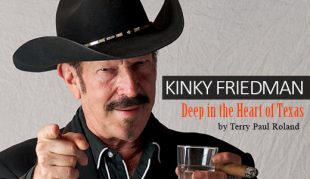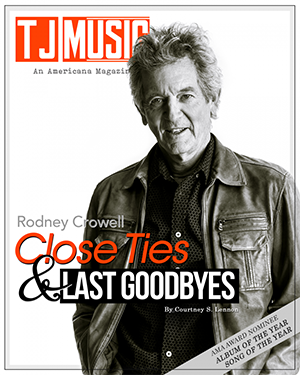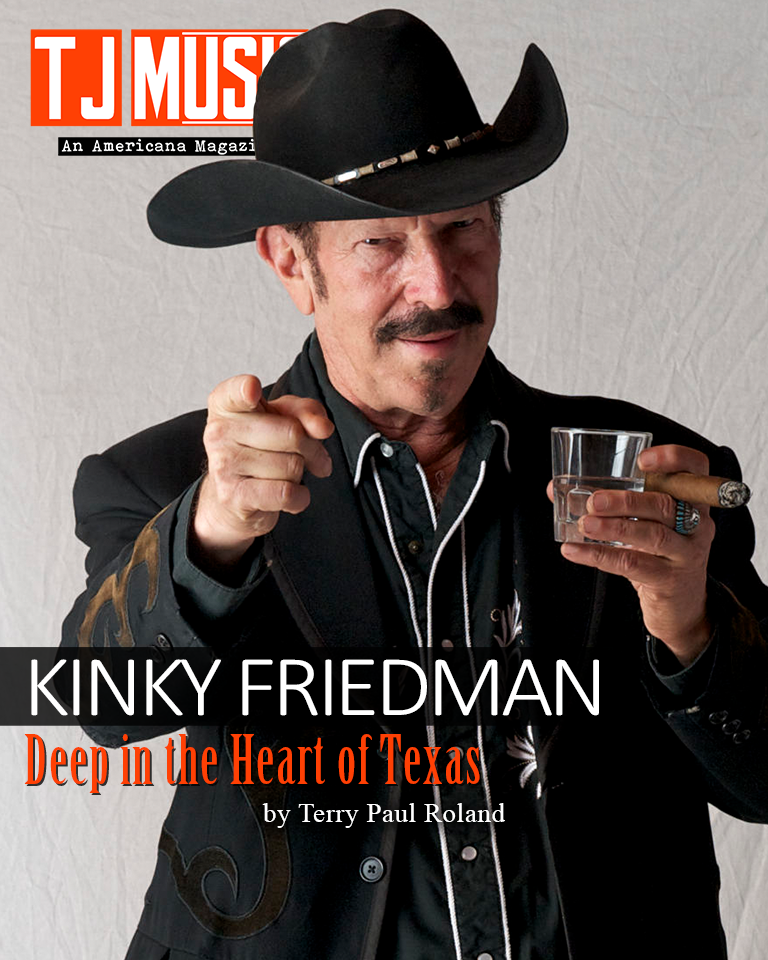
By Terry Paul Roland
As the sun sets in Southern California, Kinky Friedman is restless. On the first leg of a national tour in support of his pending release, Circus of Life (his first album of all new, original material in four decades), Friedman is like a boxer returning to the ring after a long retirement. With his “The Man in the Arena,” he’s hitting the road solo. “You know, it takes courage to do this thing, just me and my guitar,” he says, clearing his throat. Friedman calls out to his road manager for a shot of ‘Mexican Mouthwash,’ his affectionate name for what is otherwise known simply as tequila.
Friedman sits back and relishes in the orange, ambient sundown, sizing me up behind his dark brown eyes. He lights his trademark cigar, easing into the reality of the night’s performance. His eyes fog over, as he goes into a relaxed state, appearing as though he’s deep in a heavenly dream of his ranch in the Texas Hill Country, or Mr. P, his blind-deaf poodle that was lost to coyotes. His newest song, “A Dog in the Sky,” is a sweet goodbye to his old friend.
“Where were we?” he asks, coming the temporary mental fog, which he remedies by throwing back a shot of tequila. Then, a fan strolls up and presents Kinky with a small pipe full of legal California weed. “No thanks,” he says. “I can’t.” He rolls his eyes, “Bad timing.”
Kinky hasn’t smoked grass for years, a fact that is reiterated in his recently published, Mary Lou Sullivan (Raisin’ Cain: The Wild and Raucous Story of Johnny Winter) penned biography, Everything’s Bigger in Texas: The Life and Times of Kinky Friedman (Backbeat Books, 2017). The book is a biographical work of dimension that reveals the connection between his public and private personas. Like any good biography, Sullivan captures how the times not only influenced the subject, but also the influence and contributions to country music he made during his formative years. Friedman is proud of the the finished product. “It’s good. She got it right,” he says with an air of surprise.
Friedman’s life has been diverse is an understatement. He is a veteran country singer-songwriter, a best-selling author of Raymond Chandler style-pulp fiction novels, an insightful essayist, a self-styled philosopher, a gubernatorial candidate and a humorist in all things. He has a penchant for eliciting a response from his audience be it good, bad or indifferent. An hour with him feels like a cosmic conversation with W.C. Fields, Lenny Bruce, Hank Williams and Mark Twain all rolled up in the same soul.
The comparisons to Will Rogers and Mark Twain is inevitable, and often self-proclaimed. While he is loved by iconic musicians, statesmen and politicians, he never hides behind anything folksy or easy to digest. He speaks with honest unapologetic integrity and light-hearted sardonic humor.
At 73 years-old, he has a second (or third) wind, that has eased him back into live performance. “Who do you think did something great when they were 73?” he asks, somewhat rhetorically. “Kurt Vonnegut,” he proudly answers. “It can be done. And, this is my best album. How many people do that at my age?” “Well, Willie Nelson is one,” I remind. “But not many more,” he nods in agreement, waving a cloud of smoke my way.
Throughout our conversation it becomes clear that he is a master storyteller, an enigmatic character whose ultimate card trick is found in his ability to cloak Texas gruffness with intelligence, talent and compassion. To be sure, there have been few artists before or since, who have ventured into the treacherous ground of musical, literary, political and cultural satire. As a Texan, he is a cultural anomaly who knows how to engage interviewers and audiences through his colorful personality with triple-edged quotes and imaginative vulgarity. If he offends, he’s grateful. He remains politically incorrect from the left, right and center in the world of tribal ideology. This is what keeps him a fiercely independent philosopher who doesn’t mind offending anyone if he can raise a guilty chuckle and a sideways grin from his audience. His quotes, songs, and written work create laughter and tears with equal intensity. He gives his take on today’s country music, “It’s like Barry Manilow or Tequila, it might feel good at first, but it doesn’t last.”
Circus of Life shows that above all else, that Friedman is a great songwriter, with soul and substance, that skyrockets past an ordinary musical parodist. His songs and stories speak to the funny bone as well as the heart. It’s a fact acknowledged by his friend Bob Dylan. It led him to invite Kinky on tour on the historic Rolling Thunder Review in the mid-1970s. Today, Friedman’s voice has transformed similarly to Dylan. It is well age; reflecting a quality that lies somewhere between Tom Waits and Leonard Cohen.
Though Friedman wasn’t born in Texas, he is a Texan. “I was born in Chicago, couldn’t find work, so I moved to Texas where I haven’t worked since.” When his father Tom moved the family to Texas, Kinky found his home. The antisemitism was there, but it never oppressed the family nor did it result in passivity. Rather, the couple were professionals. Tom became an educational psychology professor at a university, while mother Minnie found her way as one of the first speech therapists in Texas.
With the founding Echo Hill Ranch, a youth camp in the hills south of Kerrville, Texas, Friedman’s parents became well-known throughout the Lone Star State. The camp is near Medina, Texas, which is considered the Cowboy Capital of the World. It was here where Richard “Kinky” Friedman was raised. The inclusion, openness and generosity he experienced here, was embodied by his mother, Min, who would invite neighboring cowboys, ranchers and rednecks to their home for the Jewish holiday observances. Ultimately, Friedman’s virtues are the result of his upbringing, having a good family foundation, growing up in a family with humanistic values and wisdom, which are ingrained in Friedman. They also allowed Kinky the room to grow to be who he wanted to be. During the 1960’s when counter-culture demanded that young people not trust anyone over the age of 30, Kinky didn’t rebel against his parents. Instead, he rebelled against rest of the world.
After graduating from college with honors in 1966, Kinky joined the Peace Corp, serving in Borneo, an Island in South East Asia. Along with his service, he became a teacher to the impoverished. He he equates his exotic adventures with ‘Eating monkey brains.’ Far reaching stuff for a young college graduate. But Kinky loved his time in the Peace Corp especially getting to know the natives he served. In the end, as he described in his biography there was real charm and beauty to the lives of the people in Borneo.”

In 1971, Friedman arrived in Nashville, Tenn., to pursue a career in music. The timing was right for this Jewish country singer-songwriter to make his mark. He circulated around town and the buzz about him began to grow. What wasn’t well-known until later, was that he was more than just a novelty singer. What was found by those who listened; was a damned good songwriter. It gave him admission to the exclusive club of struggling singer-songwriters.
According to his Sullivan, Kinky met Willie Nelson in 1971, at a gig at The Western Place Bar in Dallas, Texas. The first show and the three-day engagement was cancelled by the owner when, on-stage, Kinky joked, “I never say fuck in front of a C-H-I-L-D.” The club manager liked Kinky so much, that he introduced him to his friend Willie. It was the meeting that would form a life-long friendship. That same year, there was a push back against the Nashville establishment from singer-songwriters around Music City Row. The status quo was headed up by Chet Atkins and the ‘Nashville sound’ dominated the recording studios. Only select musicians were hired to play sessions, while sound engineering created a homogenized feel. There were good qualities in the sound, which began in the 1950s, but by the 1970s, the productions had grown stale and lacked any sense of originality. When orchestration and strings replaced fiddles and steel guitars something vital to country music was lost. For Chet Atkins and the Nashville establishment it was the tried and true method for lucrative hit songs.
“If it ain’t broke, break it!” The rebel country singers and songwriters, later labeled outlaws, defied the system to restore the original sound of the country music created by Jimmie Rodgers, Hank Williams and Ernest Tubb.
In 1973, Waylon Jennings made country music history. He broke away from Nashville tradition with the recording of Honky Tonk Heroes. 10 of 11 songs on the album were penned by a then unknown Texas songwriter, Billy Joe Shaver. In order to make the album, Jennings fired all the producers who had previously ruined his songs, running horns over sparse productions. He also fired all of the studio musicians and brought in his own band, the Waylors. Though he was a capable producer at the time, Waylon had no idea how to work a sound board, but he and drummer Richie Albright (the Waylors) managed to figure it out. The result, a record that did for country music what the Sex Pistols’ 1977 album, Never Mind the Bullocks did for rock music. It flushed out the bullshit and returned the music to its roots. Even though the ground swell had been growing, with the release of Honky Tonk Heroes, the outlaw movement was on.
Then came brothers Chuck and Tompall Glaser, original pioneers of the outlaw movement. With a string of country hits a decade long, Tompall Glaser was one of the four ‘outlaws’ featured on the pivotal, first ever platinum country album, Wanted: The Outlaws (1976), which also included Waylon Jennings, Jessi Colter and Willie Nelson. When Chuck Glaser heard a demo of Kinky on a trip to Los Angeles, Calif., he’d found a unique talent, giving Kinky entrance to a building the Glaser Brothers had converted into a recording studio in Nashville, which came to be known as ‘Hillbilly Central.’
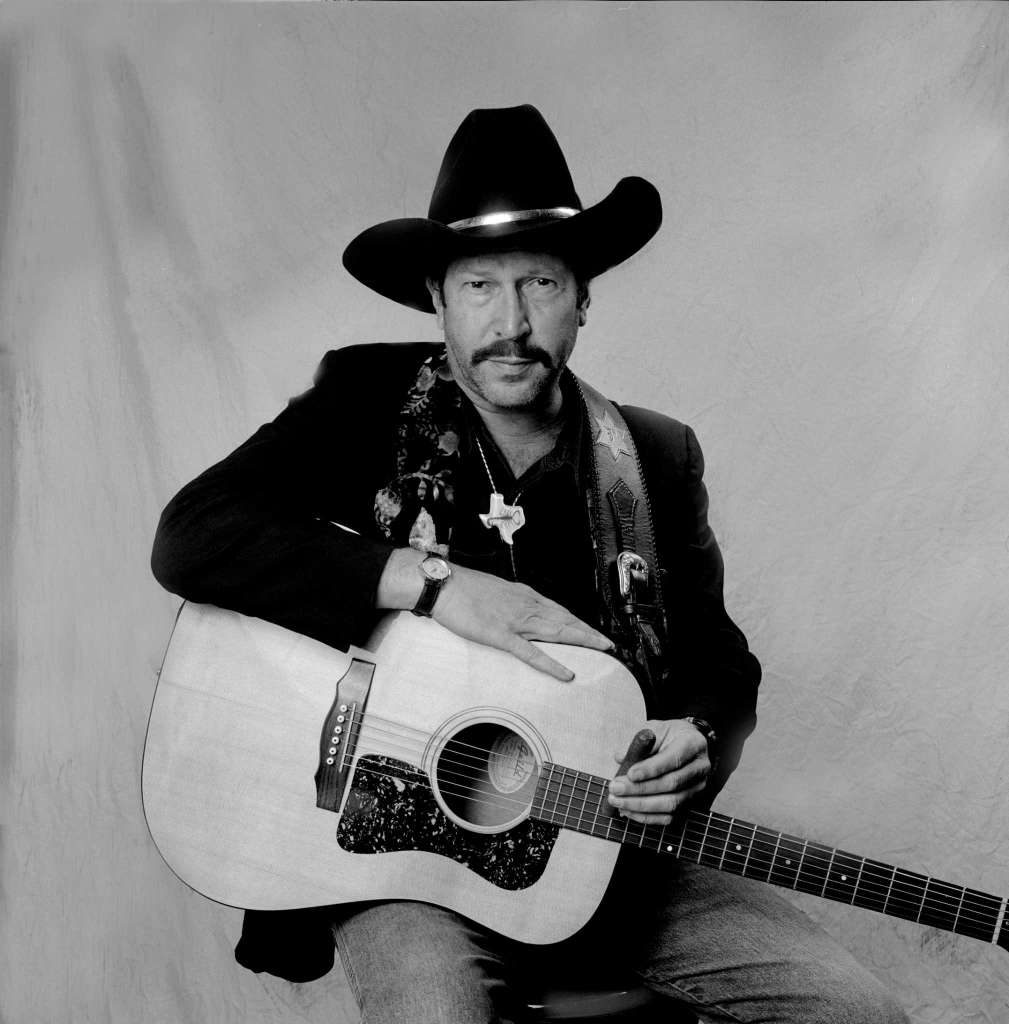
Oddly enough, Kinky’s quirky originality fit in with Tompall Glaser and the early outlaws. Most important, he was loved and championed by Willie Nelson and Waylon Jennings. Hillbilly Central was populated with soon-to-be successful songwriters like Kris Kristofferson and John Hartford. Willie Nelson would show up and sleep on the couch in Tompall’s office, with his bandanna over his eyes. It was that kind of a place. Part of it was an ongoing party, the other part was the work of recording songs.
The same year Honky Tonk Heroes was released (1973), Kinky Friedman and the Texas Jewboys put out their debut, Sold America, which ranged from the tragic to the hysterical. Chuck Glaser found Kinky a record contract at Vanguard Records in New York City. Known for jazz and classical music a decade before, the label had branched out into folk and rock music. It was home for Joan Baez, Buffy St. Marie, Ian & Sylvia and Country Joe and the Fish.
The label gave Kinky creative freedom, something that wouldn’t have happened in the Nashville at the time. The result was one more notch in the holster of the outlaw movement in that pivotal year. Kinky found his niche with a bunch of renegade songwriters ‘who were ready to make some trouble. Kinky was one of them.
Sold American, is considered a landmark album that returned to the basics of country music as the songs pushed its traditional themes beyond anything anyone ever expected. But it was the opening song, “We Reserve The Right To Refuse Service To You,” that brought Kinky national recognition and includes the classic songs include “Ride ‘Em Jewboy,” a ballad about the survivors of the Holocaust. “They Aren’t Making Jews Like Jesus Anymore,” is a protest song that pokes fun at modern Christians. The title song, “Sold American,” foreshadows the decline of real country music cloaked in a portrait of a down and out country singer. The lyrics of the first verse expertly paints the picture.
“Faded jaded falling cowboy star; Pawnshops itching for your old guitar; Where you’re going; God only knows; The sequins have fallen from your clothes; Once you heard the Opry crowd applaud; Now you’re hanging out at Fourth and Broad; On the rain wet sidewalk remembering the time; When coffee with a friend was still a dime”
“One of my proudest moments,” says Friedman, “Was being named ‘Male Chauvinist Pig of the Year’ by the National Organization of Women. That was for my song, ‘Get Your Biscuits in the Oven and Your Buns in the Bed,’” he beams. The N.O.W. award was result of a 1973 show in Buffalo, N.Y. When he sang out the opening lines; ‘You uppity women I don’t understand why you gotta go and try to act like a man,’ a group of, as he called them, ‘cranked-up lesbians,’ stormed the stage and proceeded to unplug the amps and to attack the band. The show was shut down and Friedman would not return to Buffalo until 2012. For Kinky the message was loud and clear; political correctness prevailed that day in Buffalo and has since become a negative national pastime. It is a battle he has waged throughout his career; it represents the dull blade of censorship undermining our freedom of speech. However, not all of the acknowledgments Kinky has received over the years have been dubious ones.
Kinky has another story to tell, a word-of-mouth tale which places his songs in the spotlight of history. It’s a story Kinky loves to tell. “In South Africa I met this guy named Tokyo Sexwale. He was Nelson Mandela’s right-hand man in prison. He worked for him. He was in the cell next to Mandela the entire time they were in prison. He smuggled in cassette tapes to him. One of them was songs from my first album. Well, Tokyo told me he heard Mandala play a song called “Sold American.” He also said that Mandela got the song “Ride Em Jew Boy” and Mandela would play it before going to bed. He would sometimes play it multiple times a night. It’s like something from a Kurt Vonnegut novel.”
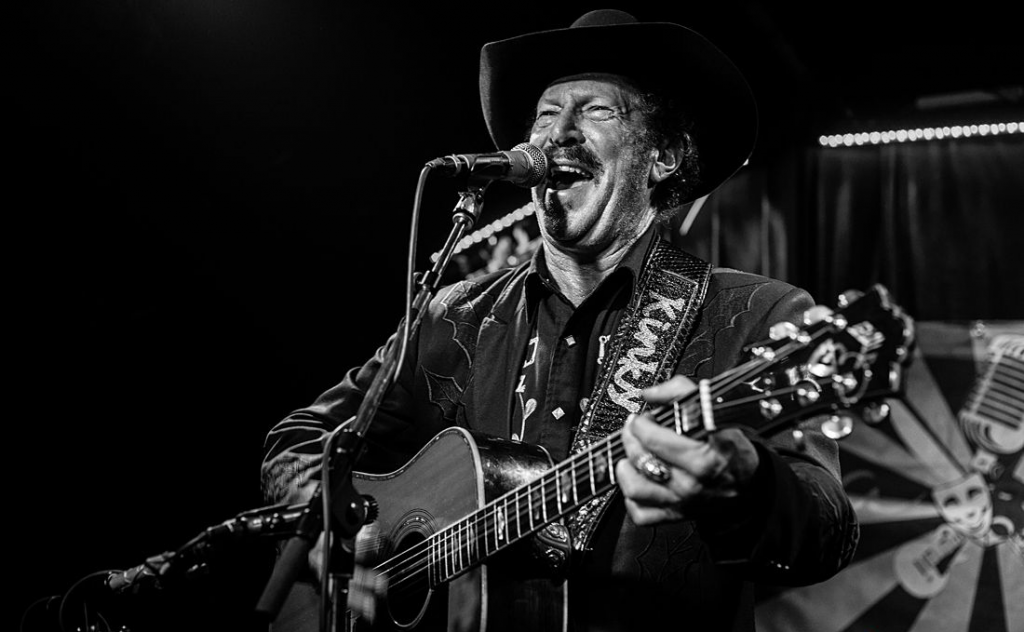
Over the half-century span of his career, Kinky has been banned, censored, celebrated and championed by many of his heroes. He spent his wild days throughout the 1970s in L.A. playing Doug Weston’s Troubadour, making friends with gonzo journalist, Hunter S. Thompson and a kindred spirit, Tom Waits. When Dylan heard “Ride “Em Jewboy” he became a fan and invited Kinky to tour with him on the legendary Rolling Thunder Review in the mid-70s.It was wild times for the Kinkster. He on the tour with Joan Baez, Joni Mitchell, Eric Clapton, Roger McGuinn and A-list of rock ‘n’ rollers in their prime. He became lifelong friends with Bob Dylan, Ramblin’ Jack Elliot and Allen Ginsburg. But, the flip-side of the success coin presented him with a life of excess and near-death.
Eventually, Kinky had all the fun he could stand. In 1980s, he quit cocaine cold turkey. Then, he picked up his pen and began writing down stories. Writing fictional Noir murder mysteries, which gave him the shelter and new success he need to heal. In the years that followed he became a best-selling author with a following in the literary genre. The twist is that Kinky is the main character in the 14 book series known as The Masters of Crime. In some circles, he is better known as an author than a singer-songwriter. Even former president, Bill Clinton read every book of the series and he requested Kinky write more books. Friedman considered including the former president as a minor character in one of his stories, but it is yet to happen.
But Circus of Life, confirms his status as a songwriter who can still bring a smile and tear. One of the most notable aspects of his songwriting, is the ability to convey stories and impressions that make his audience feel something. They have offended some, touched others and brought laughter to many. Circus of Life restored this experience, but nearly didn’t happen thanks to Andy Griffith.
“I got a call from my psychiatrist Willie Nelson at 3:00 a.m. He asked me, ‘Kinky, what are you doing?’ I told him I was watching reruns of Matlock (an old T.V. show staring Andy Griffith). He said, ‘Kinky, that’s a sure sign of depression. Turn off the TV and start writing.’” After the conversation lit a fire under him and Kinky wrote the twelve new songs which became Circus of Life. “I think this may be the best album I’ve ever done,” he says. “I think I sound kind of like Leonard Cohen on this one.”
Circus of Life, his best release in years, is an intimate, stripped down work. There is not a bad song on the record. There are no humorous novelty songs. It has the same brilliance he became known for forty-years-ago; which made a fan in Bob Dylan. It is an epic return to form, for one of the most underrated artists in country music. The song “Autographs in the Rain,” is a tribute to Willie Nelson, who is known for his loyalty to his fans. The image of Willie standing in the rain to sign autographs is not far-fetched. It is a song of gratitude from Kinky to Willie Nelson. “I’m not sure if he’s heard the song. I wouldn’t be surprised if he didn’t like it,” Friedman laughs.
The album’s centerpiece is “Jesus in Pajamas.” With a simple melody and his voice close-in and upfront, he tells the story of a homeless man who stumbles into a Denny’s restaurant in Dallas. “I wanted to help the guy, but I didn’t have anything to give him. I went back and he was gone. That was when I began to think maybe that’s Jesus in pajamas.”
As our conversation comes to an end, Kinky brings out some of his well-worn quotable comments and quips. They would be repeated on stage later that night. “I’m 73, but I read at the 75-year-old level,” he remarks. “I love Tom T. Hall’s songs and both of his melodies,” he chuckles. Then he shares one of his stump slogans used during his gubernatorial campaign, “Musicians can run this state better than politicians. We won’t get a lot done in the mornings, but we’ll work late and be honest.”
The show begins with Kinky ambling up on stage like a cowboy Charlie Chaplin. He puts on his guitar, legs first and through his strap like a pair of pants. If he is ‘the man in the arena’ and nervous about walking alone on stage, it all melts away with the enthusiastic applause from the audience. He opens with Woody Guthrie’s “Pretty Boy Floyd,” probably as much for the comfort it brings as the familiarity of the song. His parody songs cause the expected laughter. But, “Jesus in Pajamas” moves the crowd to silence. Then someone shouts, “That is a fucking great song!”
As the show winds down, Friedman reads a chapter from his e-book, A Drinker with a Writing Problem. It becomes clear the man is not only an engaging storyteller, but a fine writer. The evidence is there as he reads his story about his father, The Navigator. It is a worthy tribute to Thomas Friedman. The audience leans forward in hushed tones as they hear about the bravery of this World War II veteran who navigated the plane through dangerous skies. As Kinky puts it in his essay The Navigator in a 2001 edition of Texas Monthly, “He did not, as he contends, teach me everything I know. Only almost everything.” As Freidman reads, there is total silence, save for his voice and the distant clink of glasses in the adjoining sports bar. His reading is steady with a voice that cuts deep into the heart of the life of his father.
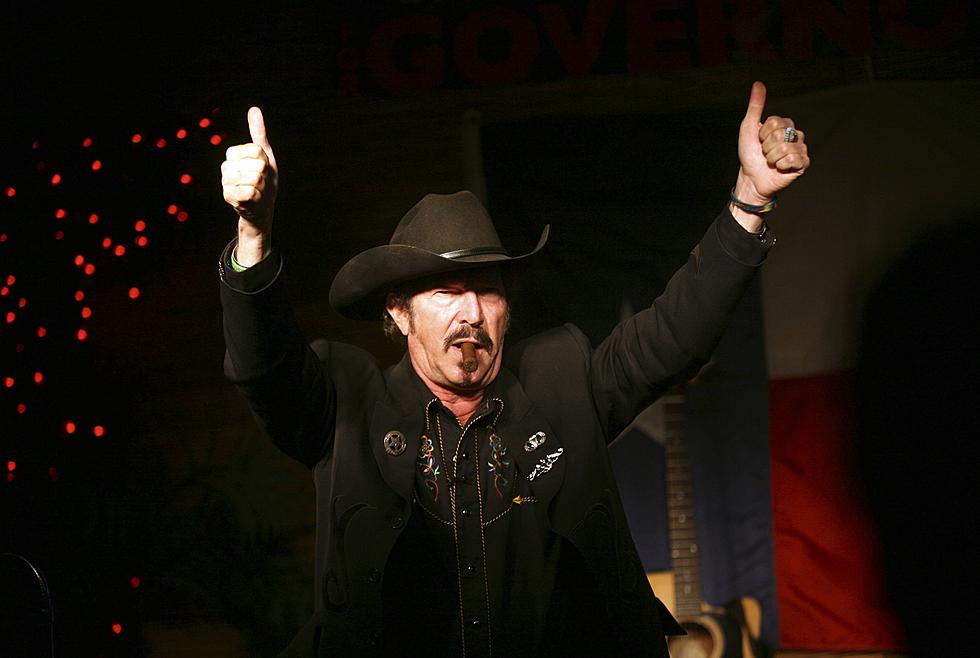
As he reads, for that few minutes the audience can see through the parodies, the satire, the rabble-rouser, the outlaw and the Jewish cowboy. In those final moments on stage, we see Richard Friedman, born in Chicago, raised in Texas as he reveals, in carefully chosen words, the father he loved and admired. Somehow, in those moments, my-Kurt-Vonnegut mind comes unstuck in time. Like his protagonist in Slaughterhouse Five, Billy Pilgrim, I am transported back 60 years in the past. My imagination turns the moment into an incarnation of a room full of campers at Echo Hill. We are listening to another man’s warm voice as he inspires us to live a full life. It is a gift from Uncle Tom Friedman. With Circus of Life, Friedman, inspires one to take on this crazy world like an aging boxer and bring to it all the love we can muster in whatever form we choose.
As I move out into the California night, there is quiet. Later, I fall into bed with the faint smell of a cigar, the memory of an old dog in the sky, the echo of funny quotes and the inspiration through story and song to keep on keeping on. I drift off to sleep with a tequila grin.
kinkyfriedman.com | fb | buy
Terry Roland
Latest posts by Terry Roland (see all)
- John Prine: An Appreciation - April 21, 2020
- Kinky Friedman: Deep in the Heart of Texas - June 18, 2018
- Chris Hillman’s Still Flying High on New Album, Bidin’ My Time - December 8, 2017

